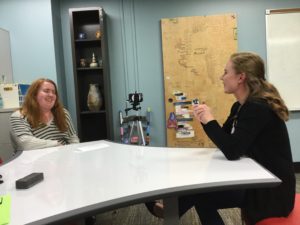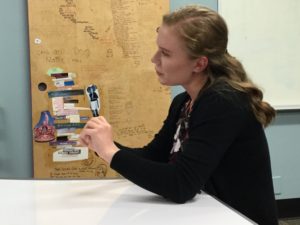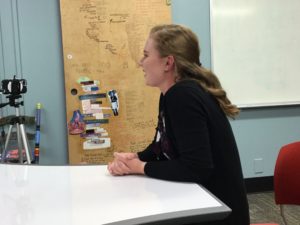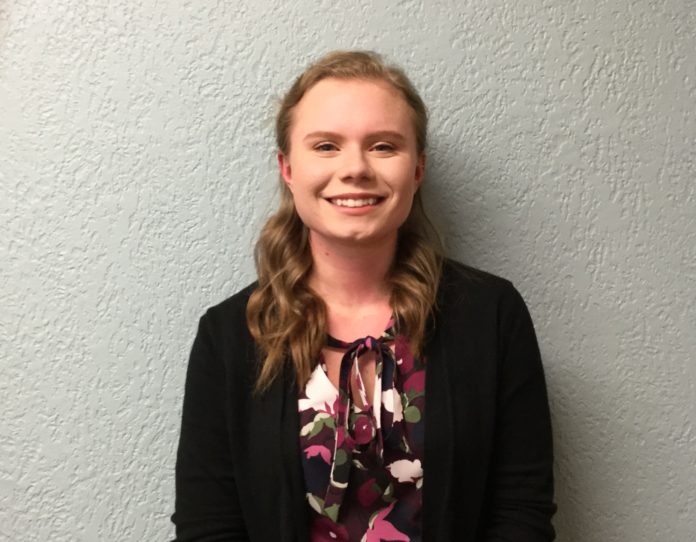Rambler Editor-in-Chief Tristan Reynolds interviewed Shelby Lewis, one of the candidates for the SGA Presidency. Read the full interview below, and read his interviews with the other candidates, as well as full Rambler coverage of the 2018 SGA Elections, here.
The transcript has been lightly edited for clarity and readability.
Tristan Reynolds: What qualifies you to be SGA President?
Shelby Lewis: Well, I’ve been on SGA since I was a freshman here, and each year I’ve become more and more involved. My freshman year, I will admit that I wasn’t as involved as I should have been, but my sophomore year I took on the responsibility of being sustainability liaison, and I think that was a very good outlet for me to become more involved with SGA, passing different proposals and helping to install more sustainability-minded projects on campus. With that, I’ve also worked with many administrators on campus, so I think I’m more close up. I’ve become closer to administrative bodies, which would help me as a president. If I became SGA president, it would help me because I had already had those connections between other people on campus, including most of the athletic staff, which I feel like not many individuals on campus are connected to. That’s a whole other aspect that hasn’t been tapped into. But I think I’m always very productive, whether it’s doing small projects or big projects, and I’m always working on trying to get something accomplished that’s going to help the student body. So I think for those reasons that I will be qualified to run for president of the SGA.
Tristan Reynolds: OK. There’s a lot of stuff I want to touch on there. To start off, you mentioned your work as sustainability liaison. What are some of the specific projects that you’ve worked on?

Shelby Lewis: So many of the projects I work on are a form of proposals, which is essentially writing out what we want done. I take it to the SGA and we vote on it, and if it gets passed, I work with administrators to like get it enforced on campus. So one of those will be to install low flow toilets into all of the updated and newly built buildings on campus because that would help save water, which is sustainable and also would help the university in the long run. A proposal I wrote this past semester was getting more water bottle filling stations in each of the buildings on campus because it makes it easier for students to fill up their bottles, which makes it easier to be sustainable and cuts back on Transy’s plastic bottle waste. Last year what I worked on for the majority of the year, with a green revolving loan fund, was working on trash can or recycling issues on campus. So currently our campus is not the best at recycling and is still trying to find new avenues to help promote recycling habits and to help people understand what they can and can’t recycle. And so for that, I made the proposal to have a matching trash can [and recycling bin] be paired together everywhere across campus, but at the moment we’re in that period where we have to first teach the student body and the faculty and the staff how to properly recycle before we can do that. So that’s something I’ve tried to, you know, encourage over the past year, and helped promote that. So then we can go and do that next step, with having trash cans and recycle bins paired everywhere. So then we become a more sustainable campus. We can recycle more and have less trash.
Tristan Reynolds: What percentage of your proposals get adopted by the full senate? How many have been carried through to what could be characterized as completion?
Shelby Lewis: So all of the ones that I’ve proposed that have been about sustainability measures have been passed on SGA. Right now I’ve been working with the administration to make sure that the water bottle fillers proposal, and then the low flow toilet proposal, are still in effect. A lot of that, a lot of what we do on SGA, is emailing people back and forth, trying to set up meetings. So I’m working on that. And then the, like I said, the recycling bin/trash can pairs have been halted because we’re trying to teach our student body and everyone else how to recycle. So usually with proposals they’re kind of an ongoing thing, so you want to make sure that they are being enforced and also being written into, not necessarily like Transylvania law, but they’re written somewhere, and then we have to follow it.
Tristan Reynolds: To close this section of the interview out, in your work in sustainability and as a senator more generally, have you been satisfied with the way that SGA is run?

Shelby Lewis: I think since my freshman year I’ve become more satisfied with the way the SGA has been run. With that, I wouldn’t necessarily say it’s whoever is in on the executive committee, I think it’s more of I have stepped up with my involvement and made sure that I am more involved in SGA, because SGA is one of those things that it is what you make it. And so I wouldn’t say I was ever discontent with who was ever running SGA, but it’s more of me being discontent with myself for not stepping forward and doing more as a Senator. So I think, over the past three years, I think I’m happier with my experience in Sustainability, but I think it’s directly correlated with me stepping up and doing more work on SGA.
Tristan Reynolds: A quick follow-up there: you mentioned that you’ve been more satisfied with your work on sustainability. Do you think that is a satisfaction shared by your constituents?
Shelby Lewis: I think so. I think that right now the student body is upset, rather than happy with what’s going on, on Transy’s campus. I don’t think it’s necessarily anything to do with SGA, but it’s hard to keep a happy constituent body, with what we’re doing when the administration and SGA aren’t on the same page with a lot of things. I also will say that it’s not necessarily my personal growth and happiness with SGA. SGA, like as a whole, like I think all the senators contribute to the happiness of constituents. And I would say that with each year, I think we’ve done more and more things to make the student body happy.
Tristan Reynolds: Here’s the obvious follow-up. You mentioned a certain level of discontent among the Transy student body. Can you outline for me what you understand that discontent to be focused on? What are the issues causing that discontent?

Shelby Lewis: I’d say right now the major discontent would be about the housing situation on campus, specifically with summer housing, which we have kind of resolved on SGA. We will have summer housing here now. But for a moment there wasn’t, and a lot of students already have jobs in Lexington, and they have internships and they’re doing research and things like that. So there was a big stress for a moment where everyone was like, “we have no idea where we’re going to be this summer because we can’t live here.” I think a lot of people are also discontented with the housing situation for next year. But I think that that’s something we will have to get past and figure out. I think now that housing selection is kind of over, I think it’s maybe not as big of an issue. But then again, I’ve heard a lot of freshmen specifically talk about how they don’t have places to live on campus because there aren’t any places to live on campus. And so I think right now, like you said, I think that’s the major thing that people are discontented with at the moment, and I think that’s something that SGA has been addressing and will continue to address.
Tristan Reynolds: The other thing you mentioned in your original answer, that I want to circle back to, is the idea of SGA and the university administration not being on the same page. What do you mean by that?
Shelby Lewis: I think, so being on SGA, you have to work up the ladder to make sure you’re really going by proper terms and going through the correct people in the right order.
Tristan Reynolds: Can I interrupt? If you’re elected President, do you believe that that’s the appropriate way for students to interact with the administration?
Shelby Lewis: I think so. I would want to encourage students to first go to people who they have a connection with already, but if not I’d just start at the bottom level and work yourself up because a lot of the times, a lot of our projects, we don’t necessarily know who exactly to go talk to. I would think I would run it the same exact way because I think it keeps us in a uniform way in order to do things. And I think it’s a good order.
Tristan Reynolds: Returning to the question, I’m sorry I cut you off there. Let me ask the sort of broader philosophical question there; as president, assuming you’re elected, how do you envision a proper relationship between SGA and the university administration?

Shelby Lewis: I think a proper relationship would be not only us communicating what we want to the administration, but I think the administration needs to come to us and say like, what do the students want or what do you think or like, come to us with an issue like such as housing. What if they came to us first and then we talked about it and gave our feedback. I think that there would be more cohesion between us and the administration if they would also come to us with ideas rather than only us coming to them with ideas to talk about.
Tristan Reynolds: Who’s us in this answer—us means SGA? Do you think that there’s a role for student feedback outside of SGA?
Shelby Lewis: Of course. I think that there’s many avenues to talk to other people, to talk to administrators on campus without having to go through SGA. I know I’ve personally reached out several times to administration that wasn’t as SGA related but something that I just wanted to talk to someone about. So I do think there’s other avenues to do that, and I think you could go through, say, College Republicans or Democrats if there’s something on campus you want to see or talk to an administrator about; you should feel welcomed to contact an administrator. So just to reiterate, I do think there’s other ways to get in touch with the administration, not only through SGA, but I would say that SGA would probably be the, not the easiest route necessarily, but would be the most appropriate route to go.
Tristan Reynolds: Moving on for a moment to more nakedly political questions. Do you expect to win?
Shelby Lewis: I don’t want to say yes or no. I’m very excited for this opportunity. I’ve had a lot of people help me with different campaign materials like fliers and tri-folds and I think that, I think I would be able to win if I work hard, but I also think that someone like Mark or Jocelyn could win if they also worked hard, and I think working hard shows how much you want it. And this is something I genuinely want, and I genuinely think that I would be able to make a difference on this campus. And for me it’s not just a resume builder; it’s to help the student body. So I don’t, I don’t, I don’t want to say yes or no, but I hope so.
Tristan Reynolds: A few things I want to touch on that, but let me ask you the other nakedly political question first. Consider for a moment your opponents. Suppose that either of them were elected, do you believe that they would carry out the duties of the job to the best of their ability?

Shelby Lewis: I do think that both of them would do a wonderful job as president. I think all of us are on somewhat equal playing field. I would say though that I think I would be a better choice just because I’m not affiliated with Greek life, and I am a student athlete on campus, which is very different from the both of them. But I do think that both of them would carry out the duties as president to the best of their abilities.
Tristan Reynolds: OK. So I’m gonna pick up on something that you’ve mentioned a few times through the course of these interviews, that you are not affiliated and that you are a student athlete. Can you talk a little bit about why you think that matters?
Shelby Lewis: So, there’s not a large amount of us on SGA that are involved with sports on campus, and my experiences with sports in general and on this campus has been very positive. I think that it gives me an outlet in a way, and I think it’s also helped me establish more leadership qualities and also time management qualities. For example, I was the first pole vaulter here at Transy, which is a very daunting task to think about, to be the first of anything, but I guess in that sense I really am a pioneer, but I will be lying to say that that didn’t scare me to come and be the only person and try to build our team up. And also with track, I’ve developed a very positive attitude about things. And especially like at track meets, people will complain if the weather’s not perfect or if the track isn’t great.  And I’ve always been that person that’s like, hey, but it’s a beautiful day or hey, you still ran a really good race. And I think that positivity that I’ve taken from sports, which would translate into me being president of SGA and keeping a positive attitude even when things we’re discussing may not be a cohesively agreed upon topic in meetings. To talk about Greek life a little bit. I think not being affiliated with Greek life helps me out or makes me a better candidate because I’m not going to be partial to one group on campus. And so just for my outside experiences with Greek life, I really was interested in joining Greek life. The thing that stopped me was the financial aspect of it. So it’s not that I was never interested in it, but I think that not being in it has made me look at the entire community as a whole, the Transy community as a whole rather than separating us into little aspects or little sections. Like this is the Greek life, this is a student athlete since I’m very involved with other things on campus. So just being like the student coordinator of Food Justice and being involved in sports. And College Democrats and things like that, I’ve been able to interweave and mingle with all these people, and I feel like sometimes that being in a Greek life organization might cut you off from other Greek life organizations and the whole community. So I’m not, I don’t want to come across as saying that being in Greek life isn’t a positive. I think it is still a positive, but I’m just seeing it in a different way.
And I’ve always been that person that’s like, hey, but it’s a beautiful day or hey, you still ran a really good race. And I think that positivity that I’ve taken from sports, which would translate into me being president of SGA and keeping a positive attitude even when things we’re discussing may not be a cohesively agreed upon topic in meetings. To talk about Greek life a little bit. I think not being affiliated with Greek life helps me out or makes me a better candidate because I’m not going to be partial to one group on campus. And so just for my outside experiences with Greek life, I really was interested in joining Greek life. The thing that stopped me was the financial aspect of it. So it’s not that I was never interested in it, but I think that not being in it has made me look at the entire community as a whole, the Transy community as a whole rather than separating us into little aspects or little sections. Like this is the Greek life, this is a student athlete since I’m very involved with other things on campus. So just being like the student coordinator of Food Justice and being involved in sports. And College Democrats and things like that, I’ve been able to interweave and mingle with all these people, and I feel like sometimes that being in a Greek life organization might cut you off from other Greek life organizations and the whole community. So I’m not, I don’t want to come across as saying that being in Greek life isn’t a positive. I think it is still a positive, but I’m just seeing it in a different way.
Tristan Reynolds: If elected, what changes would you work to bring to SGA as a whole? Or are you broadly satisfied with the course that SGA is run?
Shelby Lewis: I wouldn’t say that I’m not satisfied with the current way that SGA is ran or communicates with administration on campus, but I do think that that connection between students and administrators can be better and more cohesive on various issues. So I think I’d really like to make sure that all student voices are being heard and make sure the administration is hearing all of those and there’s not a gap between those because I feel like sometimes the administration will be like, oh, I bet the students will love this. Well, they won’t really know until they sit and talk and ask us. So I think trying to build on that relationship is very important to me. And like I said earlier, I do think that SGA should become more involved with off-campus community building activities, meeting with the surrounding community, because I know that we would go to PumpkinMania, we do things like that, but I don’t think it’s just the happiness of the Transylvania students and faculty and staff that matters. I think it also matters what the happiness of the community around us is, and they definitely could use a helping hand every once in a while. So I do think that could be a catalyst for getting out in the community more. And I also would like to keep pushing sustainability measures on campus, whether that’s me, myself doing that, or we’re in a partnership with TEAL or the next sustainability liaison. I think that that’s something that is very important to me and I think should be important to a lot of people. So I think continuing to push that and up the stance; sustainability measures on campus is something that I would definitely want to follow or follow up with and continue to do, and I think that the student or the SGA as a body will be able to promote that as well.

Tristan Reynolds: I want to follow up on something you said. You mentioned conversations between students and the administration. Do you believe that the administration would come to those conversations in good faith?
Shelby Lewis: I think that they would; I think that they would value having student input on various campus issues, and I personally think it’s wrong if they don’t want student input on issues, especially since we are such a small campus. I think my opinion would greatly change if we were sitting at UK right now, and being UK students because that is such a large student body, but here the whole point, not the whole entire point, but one of the big points about coming to Transy for me was having that connection with administrators and having connections with your professors and others on campus, and every year since I’ve been here, I think I see improvements with that, and I think that we should continue to improve upon that, and I think that the administration would come with open ears the majority of the time and be able to listen to student voice.
Tristan Reynolds: A final question, and it’s a two part question. Supposing that one of your opponents is elected, would you remain on SGA, and would you work with them? And supposing that you are elected, how would you work with your opponents, assuming they remain on SGA?
Shelby Lewis: I would of course stay on SGA. I have had a wonderful experience with SGA the past three years, and I would not give that up for anything, and I, regardless of who’s president, vice president, chief of staff, chief of finance, any of that, I would remain on SGA because I truly believe that the point of SGA is to help the student body and to create better relationships between other students and to bring people together. And me not joining SGA just because I’m not elected president would be the exact opposite of what I’m saying. So I definitely would stay on SGA, and I also believe that my opponents would also stay on SGA because I think it’s something that we all genuinely have loved being a part of, and we all love making a difference on campus. And I think that I can make a difference as president or a senator. And I think the same goes for my opponents.
Tristan Reynolds: All right, Ms. Lewis, thank you for your time.



